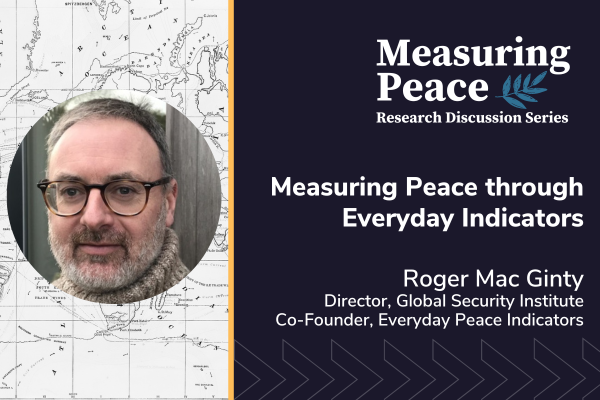
This program is co-sponsored by the Mershon Center for International Security Studies, Corrymeela Community, Northern Ireland Executive, Ulster University, and University of Bradford
Breakfast Reception is from 8:30am to 9am.
Workshop will take place from 9am to 12pm.
This interactive workshop will draw on the Everyday Peace Indicators to examine the broader scholarly and policy issue of measurement in relation to peace and other hard-to-measure social phenomena. The session will chart the evolution of the Everyday Peace Indicators, outline the methodology and policy application, as well as having a practical exercise. The core thinking behind the Everyday Peace Indicators is that local communities are best placed to identify the main trends in their lives and environment. Thus the indicators are community-sourced. This sets them apart from many other indicator systems that are top-down and 'supply-driven'. The workshop will cover a series of practical and ethical concerns linked with research in conflict-affected contexts, and consider how data collected at a granular level can be utilized for practical and policy purposes.
Speaker

Roger Mac Ginty is Professor at the School of Government and International Affairs, and Director of the Durham Global Security Institute. He is co-founder of the Everyday Peace Indicators, and his latest book "Everyday Peace: How so-called ordinary people can disrupt violent conflict" was published by OUP in 2021.
- Editor, Peacebuilding
- Everyday Peace, Winner of the 2020-2022 Ernst-Otto Czempiel Award for best book on Peace
- Conflict Disruption: Reassessing the PEace and conflict System (Open Access)
- Bottom-Up Peace: The Everyday Peace Indicators Project (YouTube)
About Measuring Peace
Is peace measurable? This presentation series brings together researchers, practitioners, and policy specialists across disciplinary backgrounds to explore the diverse and myriad ways in which peace is defined and studied.
Working from an internationally recognized Peace Studies paradigm rooted in the social sciences, Measuring Peace is premised on the belief that durable peace requires more than the absence of active conflict and violence. Rather, an enduring “positive peace” must be collaboratively cultivated through multi-level interventions on local, national, and global scales. Peace-building processes are therefore complex, non-linear, and highly fluid, and require comprehensive social, political, economic, and structural strategies.
Featured speakers in this series will present innovative approaches to the study and practice of peace around the world— and how scholarly research and analysis can help to shape effective policy and intervention strategies on the ground. Topics covered during the 2023-2024 series will include identifying micro-dynamic and everyday indicators of peace, tracking peace accord implementation, tackling paramilitarism, and promoting social healing.
Graduate students who attend at least 2 webinars and the all-day Everyday Peace Indicator workshop (https://www.everydaypeaceindicators.org/) with Dr. Roger MacGinty in March 2024 will receive a Mershon Certificate in Measuring Peace.
Guiding Questions for this Series:
- What does it mean to assess peace? What kinds of working definitions and analytical metrics can we set to make “peace” a discrete and measurable research subject?
- Which kinds of inter/disciplinary research methodologies are most generative for doing peace research? What are the benefits and limitations of different models?
- How can we productively speak to and across historically- and geographically-specific cases of violent conflict in order to make broader claims about what it means to achieve peace?
